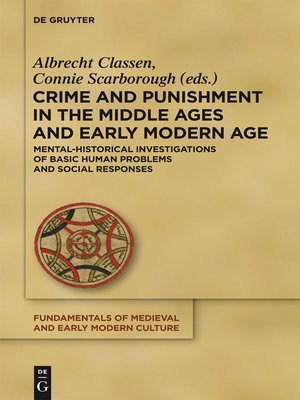Crime and Punishment in the Middle Ages and Early Modern Age
ebook ∣ Mental-Historical Investigations of Basic Human Problems and Social Responses · Fundamentals of Medieval and Early Modern Culture
By Albrecht Classen

Sign up to save your library
With an OverDrive account, you can save your favorite libraries for at-a-glance information about availability. Find out more about OverDrive accounts.
Find this title in Libby, the library reading app by OverDrive.



Search for a digital library with this title
Title found at these libraries:
| Loading... |
All societies are constructed, based on specific rules, norms, and laws. Hence, all ethics and morality are predicated on perceived right or wrong behavior, and much of human culture proves to be the result of a larger discourse on vices and virtues, transgression and ideals, right and wrong. The topics covered in this volume, addressing fundamental concerns of the premodern world, deal with allegedly criminal, or simply wrong behavior which demanded punishment. Sometimes this affected whole groups of people, such as the innocently persecuted Jews, sometimes individuals, such as violent and evil princes. The issue at stake here embraces all of society since it can only survive if a general framework is observed that is based in some way on justice and peace. But literature and the visual arts provide many examples of open and public protests against wrongdoings, ill-conceived ideas and concepts, and stark crimes, such as theft, rape, and murder. In fact, poetic statements or paintings could carry significant potentials against those who deliberately transgressed moral and ethical norms, or who even targeted themselves.






